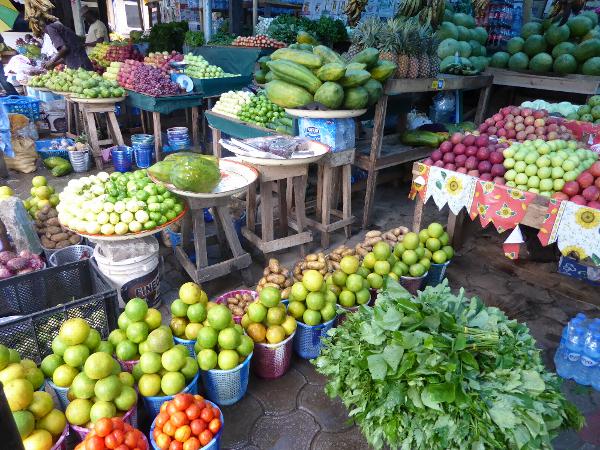Misery As Prices Of Foodstuffs Hit The Roof
Prices of bread, meat, fish, oil, yam and other essential commodities, last month, became increasingly unaffordable for Nigerians, as the inflation rate rose for the 15th consecutive month to 18.72 per cent.
Caused by impact of Naira devaluation and increase in prices of petroleum products, prices of goods and services have been rising persistently since 2015, with the inflation rate, which measures rate of increase in prices, rising from 9.3 per cent in October 2015 to 18.55 in December 2016.
For example, the price of 50 kilogrammes of Garri, rose by 285 per cent to N15, 000, last month, from N3, 900 in January last year. Similarly, 50 kilogrammes of beans that sold for N13, 500 in January 2016, rose by 33 per cent to N18, 000 last month. Also, price of 25 litres of Palm Oil rose by 208 per cent to N17, 500 , last month, from N6, 500 in January 2016. Confirming this development in its Consumer Price Index report for January, 2017, the National Bureau of Statistics (NBS) said prices of essential commodities rose at a faster pace in January pushing up the inflation rate to 18.72 per cent.
The bureau said: “The Consumer Price Index (CPI), which measures inflation, increased by 18.72 per cent (year-on-year) in January 2017, 0.17 percentage points higher from the rate recorded in December 2016 (18.55) per cent.
Increases were recorded in all COICOP divisions that yield the Headline Index. “Communication, Restaurants and Hotels again recorded the slowest pace of growth in January, growing at 5.1 per cent and 8.4 per cent (year-on-year) respectively. “However, the faster pace of growth in headline inflation, year on year, were bread and cereals, meat, fish, oil and fats; potatoes, yam and other tubers; wine and spirits, clothing materials and accessories, electricity, cooking gas, liquid and solid fuels, motor cars and maintenance, vehicle spare parts, fuels and lubricants for personal transport equipment, passenger transport by road.
“On a month on month basis, headline inflation was driven by passenger transport by air, fuels and lubricants for personal transport equipment, liquid fuels, cooking gas, oil and fats, fruits, cheese and eggs, fish, meat, bread and cereals.
“The Food Index increased by 17.82 per cent (year-on-year) in January, up by 0.43 per cent points from rate recorded in December 2016 (17.39) per cent. During the month, all major food sub-indexes increased, with soft drinks recording the slowest pace of increase at 7.8 percent(year on year).
“Price movements recorded by All Items less farm produce or Core sub-index rose by 17.90 per cent (year- on-year) in January, down by 0.20 per cent points from rates recorded in December 2016 (18.10) per cent. During the month, the highest increases were seen in Housing, Water, Electricity, Gas and other fuels; Education and Transport, growing at 27.2, 21.0 and 17.2 per cent respectively.
“On a month-on-month basis, the Headline index increased albeit, at a slower pace in January 2017. The index increased by 1.01 per cent points in January, 0.05 per cent points from 1.06 per cent rate recorded in December 2016.
“It should be noted that the Headline Index is made up of the Core Index and Farm Produce items. As Processed Foods are included in both the Core and Food sub-indices; this Implies that these sub-indices are not mutually-exclusive.
“The Urban index rose by 20.31 per cent (year-on-year) in January from 20.12 per cent recorded in December, and the Rural index increased by 17.34 per cent in January from 17.20 percent in December. “On month-on-month basis, the urban index rose by 1.03 per cent in January from 1.08 per cent recorded in December, while the rural index rose by 1.00 per cent in January from 1.04 percent in December.
The corresponding 12-month year-on-year average percentage change for the urban index increased from 17.05 per cent in December to 17.91 per cent in January, while the corresponding rural index also increased from 14.54 percent in December to 15.18 percent in January.”




